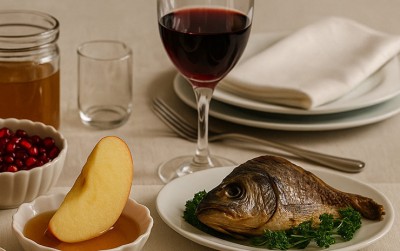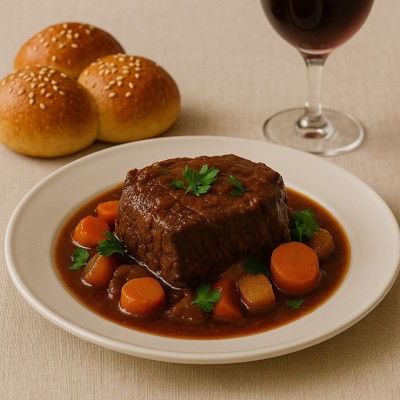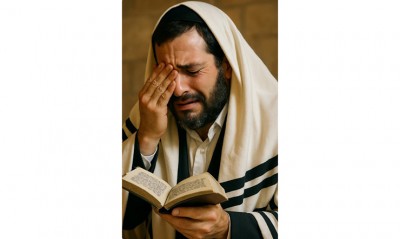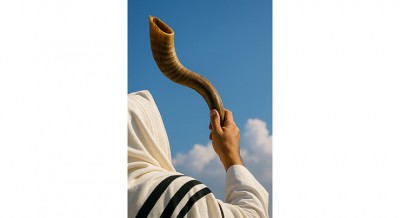



I. THE MITZVAH OF SIMCHAH ON YOM TOV AND CHOL HAMOED
The Rambam1 rules that during the seven days of Pesach, the eight days of Sukkot, and other holidays, one is obligated to be happy, each in their own unique way:
- Children should be given roasted seeds, nuts, and sweets
- Women should be provided with attractive clothing and jewelry according to one’s financial capacity.
- Men should eat meat and drink wine
Thus, the mitzvah of rejoicing on a festival (simchas yom tov) for men is fulfilled through the consumption of meat and wine. But is Rosh Hashanah on the same level as other festivals?1
II. IS ROSH HASHANAH DIFFERENT THAN OTHER HOLIDAYS
There is a disagreement among poskim (halachic authorities) regarding:
- Whether or not to recite Shehecheyanu on Rosh Hashanah.
- Whether or not to add the phrase moadim l’simchah (“seasons for joy”) in the prayers on Rosh Hashanah. 2
- Whether or not one may fast on Rosh Hashanah.3
This debate reflects different perspectives on whether Rosh Hashanah is considered a truly joyous holiday.
Furthermore, the Gemara4 teaches that Hallel is not recited on Rosh Hashanah because it is not appropriate to sing when the King is sitting on the Throne of Judgment and the Books of Life and Death are open before Him.
Based on this Gemara, the Rambam5 (R’ Moshe Ben Maimon, Spain, 1135- Egypt, 1204) rules that Hallel is not recited on Rosh Hashanah or Yom Kippur, as these days are characterized by repentance, awe, and fear, not by extra celebration.
Even though Rosh Hashanah has all the attributes of a festival (chag), one should not have additional festivities beyond the customary joy of a regular holiday. The happiness of Rosh Hashanah must be accompanied by seriousness and trepidation.
This is consistent with the ruling of the Shulchan Aruch6 (R’ Yosef Karo, Spain, 1488- Israel, 1575), which permits eating, drinking, and rejoicing on Rosh Hashanah. We do not fast on Rosh Hashanah or Shabbat Shuvah (the Shabbat of Repentance between Rosh Hashanah and Yom Kippur). However, we should not eat to the point of satiation, lest we become lightheaded and lose our sense of awe before Hashem.
Some poskim imposed restrictions upon themselves to avoid indulging in delicacies in order to maintain reverence for the day.7
(There is also debate among poskim about whether a husband must purchase new clothing for his wife on Rosh Hashanah, as is customary on other holidays.8)
The Zohar9 teaches that Rosh Hashanah and Yom Kippur are unique among Jewish holidays, characterized by greater solemnity and introspection than the other, more festive holidays.
Although Rosh Hashanah carries joy, kaddish and kedushah are chanted to the selichot melody, reflecting that joy must be infused with awe and reverence.
III. EATING MEAT ON ROSH HASHANA
The Magen Avraham (R’ Abraham Abele Gombiner 1635 – 5 October 1682) cites “Sefer Maggid Meisharim” (compilation of lessons and instructions learned from an angel that was authored by Rav Yosef Karo, codifier and author of the Shulchan Aruch) as advising against eating meat and drinking wine on Rosh Hashanah.
However, this appears to conflict with the custom, cited in the Shulchan Aruch, of eating a lamb’s head on Rosh Hashanah night as a symbolic act. Furthermore, the pasuk in Nechemiah (8:10) states: “Eat fatty foods10 and drink sweet drinks... for the joy of Hashem is your strength.” This verse is understood to refer to Rosh Hashanah.
Upon closer study of Maggid Meisharim, it becomes clear that the angel’s advice was directed only toward a select group of highly holy individuals (yechidei segulah). It was never intended for the general public.
While there is no halachic (Jewish legal) prohibition against eating fatty foods such as meat on Rosh Hashanah11, the very fact that it is debated underscores the seriousness of the day.
IV. CRYING ON ROSH HASHANA
Rav Chayim Vital (R’ Chayim ben Yoseph Vital 1542-1620) recounts that the Arizal (Rabbi Yitzchak Luria)12 would weep profusely during the prayers of Rosh Hashanah. On this day, one’s soul naturally longs for closeness to Hashem. The emotion is often so intense that it brings a person to tears, as the body struggles to contain the spiritual yearning.
The Arizal explained13 that one who does not cry on Rosh Hashanah shows that their soul is not fully attuned to Hashem. (It is compared to a Wi-Fi signal that weakens with distance from the router: so too does the connection between the soul and Hashem weaken as we stray from Him.)
Nevertheless, these tears must come from passionate longing for Hashem—not from sadness, depression, or fear.
Rav Ovadia Yosef14 clarified that crying is permitted on Rosh Hashanah, but only when it arises naturally and sincerely from the depths of one’s being during prayer. One should not force tears in an artificial manner.
Thus, unlike other holidays where crying is not encouraged, Rosh Hashanah is different—it is a day of judgment, when authentic tears are fitting.
V. CONCLUSION
Rosh Hashanah is a unique holiday. According to halachah, one may eat meat on Rosh Hashanah. Still, the day’s serious nature raises questions about indulgence. This balance reminds us that Rosh Hashanah is a day of both joy and introspection—our happiness must be tempered with awe and reverence.
Barbecuing, often seen as a casual social pastime with friends and neighbors, does not reflect the solemn spirit of this awesome day.
By Rabbi Nissan Shalomayev
Rav, Bukharian Jewish Cong. of Hillcrest, Kehilat Ohr VeAchdut1 Yom Tov 6:18
כֵּיצַד [מצות שמחת יו״ט]. הַקְּטַנִּים נוֹתֵן לָהֶם קְלָיוֹת וֶאֱגוֹזִים וּמִגְדָּנוֹת. וְהַנָּשִׁים קוֹנֶה לָהֶן בְּגָדִים וְתַכְשִׁיטִין נָאִים כְּפִי מָמוֹנוֹ. וְהָאֲנָשִׁים אוֹכְלִין בָּשָׂר וְשׁוֹתִין יַיִן שֶׁאֵין שִׂמְחָה אֶלָּא בְּבָשָׂר וְאֵין שִׂמְחָה אֶלָּא בְּיַיִן. וּכְשֶׁהוּא אוֹכֵל וְשׁוֹתֶה חַיָּב לְהַאֲכִיל לַגֵּר לַיָּתוֹם וְלָאַלְמָנָה עִם שְׁאָר הָעֲנִיִּים הָאֻמְלָלִים. אֲבָל מִי שֶׁנּוֹעֵל דַּלְתוֹת חֲצֵרוֹ וְאוֹכֵל וְשׁוֹתֶה הוּא וּבָנָיו וְאִשְׁתּוֹ וְאֵינוֹ מַאֲכִיל וּמַשְׁקֶה לַעֲנִיִּים וּלְמָרֵי נֶפֶשׁ אֵין זוֹ שִׂמְחַת מִצְוָה אֶלָּא שִׂמְחַת
כְּרֵסוֹ. וְעַל אֵלּוּ נֶאֱמַר (הושע ט ד) "זִבְחֵיהֶם כְּלֶחֶם אוֹנִים לָהֶם כָּל אֹכְלָיו יִטַּמָּאוּ כִּי לַחְמָם לְנַפְשָׁם". וְשִׂמְחָה כָּזוֹ קָלוֹן הִיא לָהֶם שֶׁנֶּאֱמַר (מלאכי ב ג) "וְזֵרִיתִי פֶרֶשׁ עַל פְּנֵיכֶם פֶּרֶשׁ חַגֵּיכֶם:
2 Machloket amongst the Geonim. See Tur O.H 582
3 Rosh (Rabbenu Asher 1250 or 1259 – 1327)
4 Rosh Hashanah 32b, Arachin 10b
אָמַר רַבִּי אֲבָהוּ: אָמְרוּ מַלְאֲכֵי הַשָּׁרֵת לִפְנֵי הַקָּדוֹשׁ בָּרוּךְ הוּא: רִבּוֹנוֹ שֶׁל עוֹלָם! מִפְּנֵי מָה אֵין יִשְׂרָאֵל אוֹמְרִים שִׁירָה לְפָנֶיךָ בְּרֹאשׁ הַשָּׁנָה וּבְיוֹם הַכִּפּוּרִים? אָמַר לָהֶם: אֶפְשָׁר מֶלֶךְ יוֹשֵׁב עַל כִּסֵּא דִין, וְסִפְרֵי חַיִּים וְסִפְרֵי מֵתִים פְּתוּחִין לְפָנָיו — וְיִשְׂרָאֵל אוֹמְרִים שִׁירָה?!
5 3:6
משנה תורה, הלכות מגילה וחנוכה
אֲבָל רֹאשׁ הַשָּׁנָה וְיוֹם הַכִּפּוּרִים אֵין בָּהֶן הַלֵּל לְפִי שֶׁהֵן יְמֵי תְּשׁוּבָה וְיִרְאָה וָפַחַד לֹא יְמֵי שִׂמְחָה יְתֵרָה
6 O.H 597:1
אוכלים ושותים ושמחים ואין מתענין בר"ה ולא בשב' שובה אמנם לא יאכלו כל שבעם למען לא יקלו ראשם ותהיה יראת ה' על פניהם
7 Magen Avraham O.H 597:1
כתב הב"ח שמהרש"ל לא אכל דגים בר"ה שהיו חביבים עליו (עמ"ש סי' תקפג) ורצ' למעט תאותו בדבר מסוים וכ"כ בשל"ה
8 See further in Shu”t Merkavot Argaman vol.9 O.H 11 note 1
9 Emor 95a
10 The Maggid Meisharim posits that Nechemia's reference to "fatty foods" must actually be referring to fatty dairy products, rather than meats.
11 Yalkut Yosef, Yamim Nora’im, p. 271, Shofar BeTzion, p. 148
12 Shaar Kavanot 90a
31 מי שאין בכי' נופלת עליו בימים האלו הוא הוראה שאין נשמתו הגונה ושלימה
41 שו”ת יחוה דעת חלק ב סימן סט
המורם מכל האמור, שאין לבכות בראש השנה. והתפלות של ראש השנה יש לאומרם בשמחה ובנעימה קדושה, ומתוך כוונה רבה, כי תפלה בלא כוונה כגוף בלא נשמה. ומכל מקום אדם שמתעורר מעצמו בבכיה ומתפלל בדמעות שליש, אין בזה שום חשש איסור כלל. ותבוא עליו ברכה. והשי”ת יקבל תפלתינו ברצון ונזכה כולנו יחד עם כל בית ישראל לשנה טובה ומבורכת כתיבה וחתימה טובה.
וע״ע שו״ת יביע אומר ח״י או״ח סימן מג
Barbequing On Rosh Hashanah
Typography
- Smaller Small Medium Big Bigger
- Default Helvetica Segoe Georgia Times
- Reading Mode




